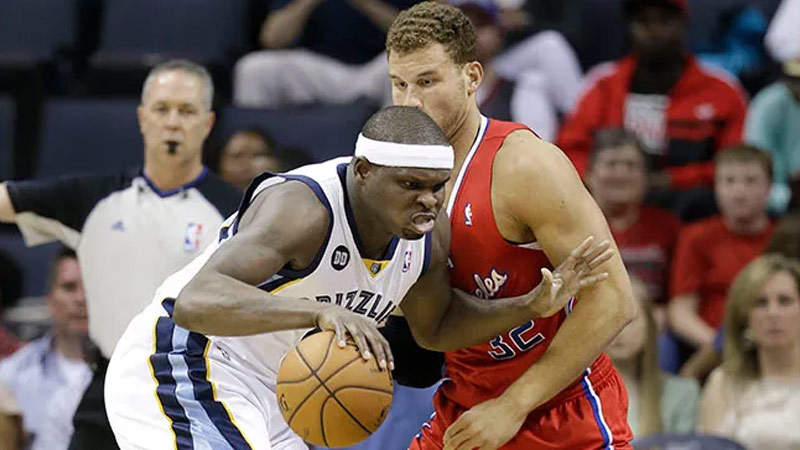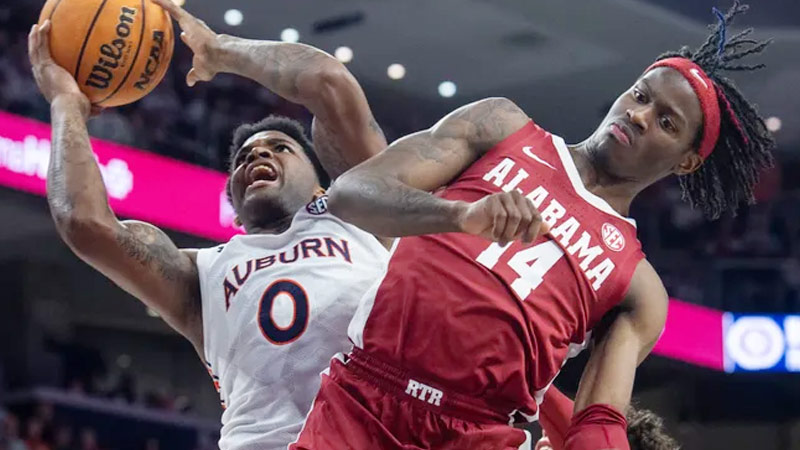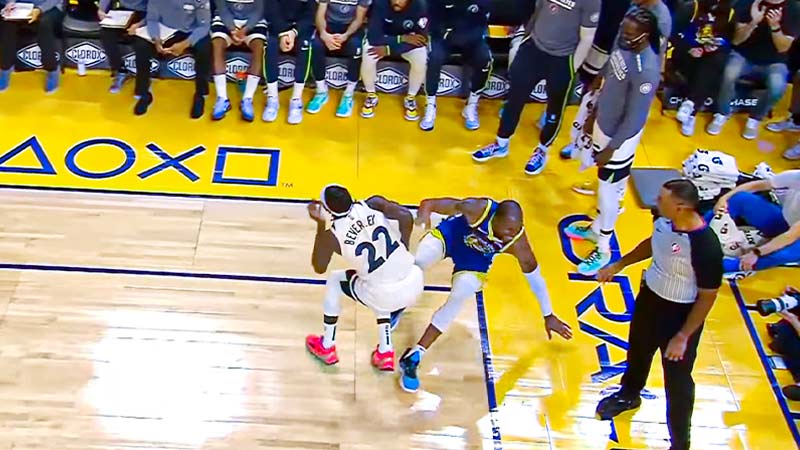In the fast-paced world of basketball, the game is often subject to various rules and regulations that govern player conduct and interactions. One such scenario that can occur during a match is a “double foul.”
If you’ve ever wondered what a double foul is and how it affects the game, you’ve come to the right place.
In this comprehensive guide, we will explore the concept of a double foul in basketball, its implications for players and teams, and how it is officiated. Get ready to dive into the intricacies of this unique occurrence on the basketball court. So, stay focused.
What Is a Double Foul in Basketball?
A double foul in basketball occurs when two players commit fouls against each other simultaneously or in very close succession during live play. Neither team gains an advantage from the fouls, and the game is interrupted by the officials blowing their whistles.
Both players involved are charged with personal fouls, which count toward their individual foul counts. No free throws are awarded, and possession usually remains with the team that had the ball when the double foul occurred.
While it does not directly impact scoring or possession, a double foul can affect player foul counts and playing time. The concept of a double foul provides insight into the intricacies of basketball officiating and ensures a smoother game flow.
The Basics of Double Foul in Basketball

Source: ftw.usatoday.com
A double foul in basketball is a unique occurrence that involves two players committing fouls against each other simultaneously or in very close succession.
It can lead to a stoppage in play and has specific implications for both players and the game. Let’s explore the basics of a double foul in more detail:
Definition of Double Foul
A double foul is when two players on opposing teams commit fouls against each other during active play. The fouls are often unrelated and can include physical contact, such as pushing, holding, or illegal screens.
No Advantage Gained
Unlike regular fouls that result in free throws or a change of possession, a double foul does not grant any advantage to either team. It is essentially a neutral foul situation.
Officiating a Double Foul
When a double foul occurs, the officials blow their whistles to stop the game. Referees signal a double foul by raising both hands and indicating a foul on each player involved.
Personal Foul Count
Both players involved in the double foul are charged with personal fouls, which count toward their individual foul counts. If a player has accumulated multiple personal fouls, a double foul could impact their playing time.
Possession and Reset
The team that had possession at the time of the double foul usually retains the ball after the stoppage. The shot clock may be reset to a specific time, depending on the league or competition rules.
Examples of Double Foul Situations

Source: tuscaloosanews.com
These examples illustrate how double foul situations can arise during intense moments of physical play on the basketball court.
Simultaneous Pushing or Holding
In a rebounding battle under the basket, two players from opposing teams may engage in physical contact while jostling for position. Both players push or hold each other, resulting in a double foul call by the officials.
Clashing for Loose Ball
When players dive for a loose ball on the floor, collisions can occur, leading to a double foul situation. Both players may inadvertently trip or collide with each other while trying to gain possession, resulting in a double foul call.
Wrestling for Position
During a post-up situation, two players may aggressively wrestle for the position in the low post area. If both players initiate physical contact and neither gains a clear advantage, the officials may call a double foul.
Intense Screen Battle
In a pick-and-roll scenario, the screener and the defender can engage in a physical battle to gain position or avoid the screen. If both players commit fouls against each other during this exchange, it may result in a double foul.
Hand Check Exchange
During perimeter play, two players may engage in hand-checking, trying to impede each other’s movement. If both players maintain contact and foul each other simultaneously, a double foul may be called by the officials.
Penalty for Double Foul
When a double foul occurs in basketball, it involves two players committing fouls against each other simultaneously or in very close succession during live play.
While double foul results in a stoppage of the game and both players being charged with personal fouls, there are specific penalties and consequences associated with this unique situation.
No Free Throws
One key distinction of a double foul is that neither team is awarded free throws. Unlike a regular foul, where the fouled player may go to the free-throw line, a double foul does not grant this advantage to either team.
Possession Remains
Typically, the team that had possession of the ball at the time of the double foul retains possession after the play is stopped. The game resumes with an inbound pass to that team.
Foul Count Accumulation
Both players involved in the double foul are charged with personal fouls. This counts towards their foul counts. If either player was already in foul trouble, this can further impact their playing time and on-court strategy.
Disqualification Concerns
Since personal fouls are accumulated with a double foul, there is a possibility that a player may foul out of the game if they reach the maximum allowable fouls (usually five or six in most leagues).
A player’s disqualification can significantly impact their team’s performance and rotations.
Impact on Team Strategy
If key players are involved in a double foul, teams may need to adjust their strategy or rotations to manage player foul trouble effectively. Coaches may opt to substitute players earlier or modify defensive assignments to avoid further foul complications.
Controversies and Challenges of Double Foul in Basketball
Check out the following part to know about some controversies and challenges of double fouls in basketball.
Interpretation and Consistency
One of the major challenges with double fouls is the interpretation and consistency in officiating.
Different referees may have varying thresholds for calling a double foul, leading to confusion among players, coaches, and fans. Inconsistent officiating can create controversies and impact the outcome of close games.
Impact on Key Players
Double fouls can be particularly problematic when involving key players. If a star player on either team gets into foul trouble due to a double foul, it can significantly affect the team’s overall strategy. This can alter the dynamics of the game and potentially disadvantage one team.
Foul Accumulation
Double fouls contribute to the overall foul count for individual players. If players are close to fouling out, a double foul may push them over the limit, leading to disqualification from the game. This can be a contentious issue if it involves critical players during crucial moments.
Disruption of Game Flow
The stoppage of play due to a double foul can disrupt the flow of the game, affecting the rhythm and momentum of both teams. It can lead to breaks in action, which may impact the overall excitement and entertainment value for spectators.
Clarity and Communication
Sometimes, players and coaches may not fully understand the reasoning behind a double foul call. The lack of clear communication from officials about the decision can lead to frustration and misunderstandings in the court.
Impact on Team Strategy
A double foul can force teams to adapt their strategy on the fly. If multiple players on either team are involved in double fouls, coaches must make quick adjustments to their rotations and lineup, which can be challenging during intense game situations.
Handling Physical Play
Double fouls are often the result of physical play, and determining the line between aggressive play and fouls can be difficult for officials. Striking the right balance between allowing physicality and enforcing rules is a continuous challenge in basketball.
Significance of Double Foul in Basketball
The significance of a double foul in basketball lies in its role as a fair and neutralizing mechanism. It addresses simultaneous infractions, holds players accountable, and prevents one team from gaining an advantage.
Simultaneous Infractions
A double foul is significant in basketball because it addresses situations where two players commit fouls against each other at the same time.
It prevents one player from being unfairly penalized for a foul they did not initiate and ensures that both players are held accountable for their actions on the court.
Neutralizing Advantages
In cases of a double foul, neither team gains an advantage. This aspect is crucial in maintaining fairness and integrity in the game. The stoppage in play allows the officials to assess the situation accurately and prevent any team from benefiting from the fouls.
Player Accountability
A double foul reinforces player accountability. It reminds players to be mindful of their actions during physical interactions and encourages them to play the game with sportsmanship and respect for their opponents.
Impact on Foul Counts
Both players involved in a double foul have a personal foul added to their individual foul counts. This can be significant for players who are already in foul trouble, as it can limit their playing time and affect their team’s defensive and offensive strategies.
Disqualification Risk
For players nearing the foul limit, a double foul increases the risk of fouling out of the game. Accumulating too many fouls can lead to disqualification, forcing the team to adjust its lineup and potentially affecting the game’s outcome.
Officiating Consistency
Handling double fouls showcases the proficiency of basketball officials. Properly identifying and addressing these situations ensures consistent officiating, promoting a fair and competitive environment for players and teams.
Game Flow and Momentum
Double fouls can momentarily disrupt the game flow and momentum. The stoppage allows teams to regroup and reassess their strategies, potentially impacting the pace and dynamics of the match.
FAQs
What is a double foul in basketball?
A double foul occurs when two players commit fouls against each other simultaneously or in very close succession during live play. In this scenario, neither player gains an advantage, but their actions result in an interruption of the game.
The fouls are usually unrelated, and they often involve physical contact, such as pushing, shoving, or holding.
How is a double foul called by the officials?
When a double foul is observed by the officials, they blow their whistles to stop the game. The referees then signal a double foul by raising both hands and signaling a foul on each player involved.
The ball is then typically inbounded by the team that had possession at the time of the double foul. No free throws are awarded to either team, and the shot clock is usually reset to a specific time, depending on the rules of the league or competition.
Does the double foul count toward personal fouls for individual players?
Yes, in most basketball leagues, double fouls are counted as personal fouls for each player involved. For instance, if a player already has three personal fouls and commits a double foul, they will be credited with an additional personal foul, bringing their total to four.
What is the impact of a double foul on the game?
A double foul can disrupt the flow of the game and lead to stoppages in play. Since no team gains an advantage from a double foul, it does not result in free throws or a change of possession.
However, if a key player on either team is involved in a double foul and gets into foul trouble, it can affect their playing time and strategy moving forward.
Can a player foul out of the game due to a double foul?
Yes, a player can foul out of the game due to a double foul, just as they would with consecutive personal fouls. In most leagues, a player is disqualified from the game once they accumulate a certain number of personal fouls, typically five or six.
Conclusion
The double foul is a unique occurrence in basketball where two players commit fouls against each other simultaneously or in close succession.
It results in a stoppage of play, and neither team gains an advantage from the fouls. Although it does not impact possession or result in free throws, it can affect individual players’ foul count and playing time.
The concept of a double foul enhances our comprehension of the intricacies of basketball rules and officiating, adding depth to our appreciation of the game.
As players, coaches, and fans, having a clear understanding of the double foul ensures a smoother and more enjoyable basketball experience on the court. Best of luck.







